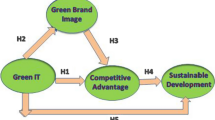Abstract
The role of ethics is very important in the practice of manufacturing activities in Indonesia, especially Islamic environmental ethics (IEE) and Islamic business ethics (IBE). This study will examine the moderating role of IEE and IBE in the relationship between green product innovation and green process innovation on sustainability competitive advantage. The number of respondents who participated were 145 Islamic entrepreneurs in Central Java. The sampling technique used is purposive sampling. The results show that green product innovation and green process innovation have a significant impact on sustainable competitive advantage. Meanwhile, IEE and IBE moderate the relationship between green innovation and sustainable competitive advantage. The limitations and agenda of future research are also presented in this article.
Access this chapter
Tax calculation will be finalised at checkout
Purchases are for personal use only
Similar content being viewed by others
References
Al-Damkhi, A.M.: Environmental ethics in Islam: Principles, violations, and future perspectives. Int. J. Environ. Stud. 65(1), 11–31 (2008). Doi: https://doi.org/10.1080/00207230701859724
Barney, J.B.: Firm resources and sustained competitive advantage. J. Manage. 17(1), 99–120 (1991). https://doi.org/10.1177/014920639101700108
Bekk, M., Spörrle, M., Hedjasie, R., Kerschreiter, R.: Greening the competitive advantage: antecedents and consequences of green brand equity. Qual. Quant. 50(4), 1727–1746 (2015). https://doi.org/10.1007/s11135-015-0232-y
Cerda Planas, L.: Moving toward greener societies: moral motivation and green behaviour. Environ. Resour. Econ. 70(4), 835–860 (2018). Doi:https://doi.org/10.1007/s10640-017-0167-y
Chang, C.H.: The influence of corporate environmental ethics on competitive advantage: the mediation role of green innovation. J. Bus. Ethics 104(3), 361–370 (2011). https://doi.org/10.1007/s10551-011-0914-x
Chen, Y.S.: The positive effect of green intellectual capital on competitive advantages of firms. J. Bus. Ethics 77(3), 271–286 (2008). https://doi.org/10.1007/s10551-0069349-1
Chen, Y.-S., Chang, C.-H., Yeh, S.-L., Cheng, H.-I.: Green shared vision and green creativity: the mediation roles of green mindfulness and green self-efficacy. Qual. Quant. 49(3), 1169–1184 (2014). https://doi.org/10.1007/s11135-014-0041-8
Chen, Y.S., Lai, S.B., Wen, C.T.: The influence of green innovation performance on corporate advantage in Taiwan. J. Bus. Ethics 67(4), 331–339 (2006). https://doi.org/10.1007/s10551-006-9025-5
Cheng, C.C.J.: Sustainability orientation, green supplier involvement, and green innovation performance: evidence from diversifying green entrants. J. Bus. Ethics 161(2), 393–414 (2018). https://doi.org/10.1007/s10551-018-3946-7
de Medeiros, J.F., Vidor, G., Ribeiro, J.L.D.: Driving factors for the success of the green innovation market: a relationship system proposal. J. Bus. Ethics 147(2), 327–341 (2015). https://doi.org/10.1007/s10551-015-2927-3
Geng, Y., Xinbei, W., Qinghua, Z., Hengxin, Z.: Regional initiatives on promoting cleaner production in China: a case of Liaoning. J. Clean. Prod. 18(15), 1500–1506 (2010). https://doi.org/10.1016/j.jclepro.2010.06.028
González-Benito, Ó., González-Benito, J.: Environmental proactivity and business performance: an empirical analysis. Omega 33(1), 1–15 (2005). https://doi.org/10.1016/j.omega.2004.03.002
Huang, J.-W., Li, Y.-H.: Green innovation and performance: the view of organizational capability and social reciprocity. J. Bus. Ethics 145(2), 309–324 (2015). https://doi.org/10.1007/s10551-015-2903-y
Iles, A.: Shifting to green chemistry: the need for innovations in sustainability marketing. Bus. Strateg. Environ. 17(8), 524–535 (2008). https://doi.org/10.1002/bse.547
Majeri Mangunjaya, F., Elizabeth McKay, J.: Reviving an islamic approach for environmental conservation in Indonesia. Worldviews: Global Religions, Culture, and Ecology 16(3), 286–305 (2012). https://doi.org/10.1163/15685357-01603006
Peng, Y.S., Lin, S.S.: Local responsiveness pressure, subsidiary resources, green management adoption and subsidiary’s performance: evidence from taiwanese manufactures. J. Bus. Ethics 79(1–2), 199–212 (2008). https://doi.org/10.1007/s10551-007-9382-8
Prasad, S., Shankar, R., Gupta, R., Roy, S.: A TISM modeling of critical success factors of blockchain based cloud services. J. Adv. Manage. Res. 15(4), 434–456 (2018). https://doi.org/10.1108/JAMR-03-2018-0027Purba-Rao.(n.d.)
Rondinelli, D.A., Berry, M.A.: Corporate environmental management and public policy: Bridging the gap (2000)
Tlaiss, H.A.: How Islamic business ethics impact women entrepreneurs: insights from four Arab middle eastern countries. J. Bus. Ethics 129(4), 859–877 (2014). https://doi.org/10.1007/s10551-014-2138-3
Acknowledgment
The research team would like to thank: the Director General of Higher Education, Ministry of Education and Culture, and the Dean of the Faculty of Economics, Unissula, who have financed and encouraged the research and publication of this article. The team also thanked LPPM Unissula who have encouraged and facilitated this research activity. As well we thank the parties involved with implementation of research activities.
Author information
Authors and Affiliations
Corresponding author
Editor information
Editors and Affiliations
Rights and permissions
Copyright information
© 2022 The Author(s), under exclusive license to Springer Nature Switzerland AG
About this paper
Cite this paper
Cahyono, B., Nugroho, M. (2022). Achieving Sustainable Competitive Advantage Through Green Innovation; the Moderating Effect of Islamic Environmental Ethics and Islamic Business Ethics. In: Barolli, L. (eds) Complex, Intelligent and Software Intensive Systems. CISIS 2022. Lecture Notes in Networks and Systems, vol 497. Springer, Cham. https://doi.org/10.1007/978-3-031-08812-4_23
Download citation
DOI: https://doi.org/10.1007/978-3-031-08812-4_23
Published:
Publisher Name: Springer, Cham
Print ISBN: 978-3-031-08811-7
Online ISBN: 978-3-031-08812-4
eBook Packages: Intelligent Technologies and RoboticsIntelligent Technologies and Robotics (R0)




